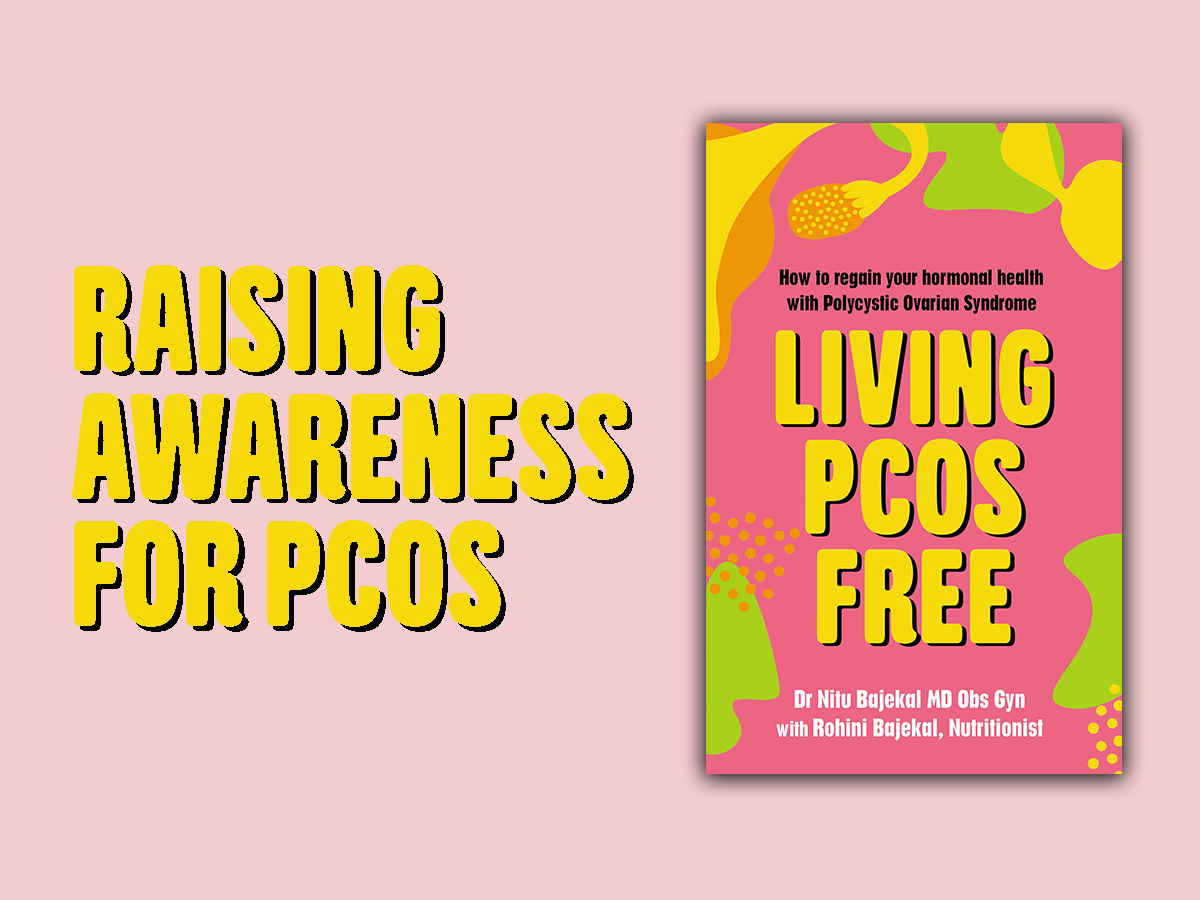
Blog post written by Rohini Bajekal, co-author of upcoming release ‘Living PCOS Free’, launching in February 2022.
This September is PCOS Awareness Month. Despite PCOS being the most common endocrine condition to affect women of reproductive age and those AFAB (assigned female at birth), with at least 1 in 10 affected, most people have never heard of it. Depending on how hard one looks for the condition, up to 3 in 4 of those with PCOS remain undiagnosed.
PCOS is the number one cause of anovulatory infertility and those with the condition are at greater risk of a number of long-term conditions, including type 2 diabetes, gestational diabetes, cardiovascular disease, metabolic syndrome and endometrial cancer.
PCOS is a chronic condition so, while there is no “cure”, making positive lifestyle changes can go a long way in managing PCOS and its symptoms, including insulin resistance, both in the short-term and longer term. Lifestyle modifications can tackle the underlying insulin resistance. All national and international guidelines recommend lifestyle and behavioural changes as the first line of management for PCOS, even before medications.
Knowledge is power and education is key. Raising awareness of what to look out for allows those with PCOS to access early help, support and advice. This may be through campaigns such as PCOS awareness month, workshops and education in schools or even by opening up the conversation between friends, family and colleagues.
Living PCOS Free is a practical guide which shows readers how to manage PCOS using proven lifestyle approaches alongside conventional medicine. Dr Nitu Bajekal, AKA ‘The Plant Based Gynae,’ dispels misinformation and tackles irregular periods, infertility, acne, weight gain and more.
For the diagnosis of Polycystic Ovarian Syndrome, any two out of three of the criteria below have to be met (Rotterdam criteria, 2003).
- Ovulatory dysfunction (oligo- or anovulation: not producing eggs on a regular basis)
- Clinical symptoms or biochemical (lab) evidence of androgen excess: (Increased levels of androgens including testosterone)
- Polycystic ovarian appearance in one or both ovaries on pelvic ultrasound scan (specific features such as number of follicles, volume of ovary)
There are some common symptoms of PCOS, but it is important to mention that not everyone with the condition will have all the symptoms and vice versa (these symptoms may have other causes) so it is important to get a proper diagnosis:
- Infrequent periods or missed periods are the most common sign of PCOS (oligomenorrhoea/amenorrhoea). NB: Pain is not a feature of PCOS. Painful and/or heavy periods or painful sex may be signs of endometriosis, fibroids and/or adenomyosis, all of which can affect fertility. Missed or infrequent periods could be a result of other conditions such as hypothalamic amenorrhoea resulting from calorie restriction (disordered eating, for example, or over-exercising).
- Excess facial/body hair (hirsutism)
- Acne (often adult and/or cystic)
- Scalp hair loss (alopecia)
- Unwanted weight gain
- Insulin resistance
- Fertility problems
There are several less well-known symptoms including:
- Eating disorders, especially binge eating disorders without purging, unlike bulimia. (This may be missed, especially in those from different ethnic groups or those with excess weight. Referral to a therapist, dietitian specialising in medical nutrition therapy or another specialist, such as an endocrinologist or dermatologist, may be needed.)
- Excessive daytime sleepiness
- Breathing problems (sleep apnoea, snoring)
- Acanthosis nigricans (darkened skin: behind the neck, underarms, groin).
- Psychological issues such as depression and anxiety, which must be addressed.
Lifestyle matters and nutrition is the cornerstone
A plant-predominant dietary pattern
Given the commonality of PCOS among those with type 2 diabetes, and the higher risk of other serious health conditions, people with PCOS should be advised to focus on predominantly whole plant foods, including whole grains, beans, fruit, vegetables, nuts and seeds, herbs and spices. These foods are full of fibre and micronutrients that are nourishing and absorbed slowly, helping to normalise blood sugars. We know this works very well in people with type 2 diabetes and metabolic syndrome. Living PCOS Free is packed with tasty and nutritious plant-based recipes with gluten-free and oil-free options.
Exercise
Regular movement in a form that you enjoy is key. Aerobic exercise and resistance training, including high intensity interval training (HIIT) are all recommended to help improve insulin sensitivity in women with PCOS. Aim for 300 minutes of exercise per week (approximately one hour a day) and try to exercise outdoors in natural light.
Sleep
Ensure a regular sleep routine with seven to nine hours of restorative sleep.
Stress management and reduction
Consider exercise, meditation, mindfulness, community work, psychotherapy or yoga to help manage stress and lower cortisol levels which make insulin resistance worse.
Positive social connections
Build or join a community, whether online or offline; ensure you have a support network or a friend you can trust and confide in. Loneliness is a source of chronic stress and is associated with an increased risk of heart disease, high blood pressure and type 2 diabetes.
Avoid or limit risky substances
Eliminate risky substances such as drugs and tobacco and limit alcohol (people with PCOS are at higher risk of non-alcoholic fatty liver disease), which has no health benefits.
Living PCOS Free features an easy-to-follow 21-day plan by Nutritionist Rohini Bajekal, illuminating case histories and plant-based recipes.
https://nitubajekal.com/pcos-nutrition/
Dr Nitu Bajekal MD FRCOG Dip IBLM
Consultant Obstetrician and Gynaecologist
Lifestyle Medicine Physician
Rohini Bajekal Nutritionist and Lifestyle Medicine Professional
About the authors
Dr Nitu Bajekal, MD is a Senior NHS Consultant Obstetrician and Gynaecologist in the UK with over 35 years of clinical experience in women’s health. Her special interests include Lifestyle Medicine, PCOS, endometriosis, period problems, menopause, precancer, complex vulval problems and medical education. She is a keyhole surgeon with experience in laparoscopic procedures, including robotics.
Rohini Bajekal MA Oxon, MSc Nutrition, Dip IBLM, is a Nutritionist and Board-Certified Lifestyle Medicine Professional based in London. Rohini is passionate about PCOS and has personal experience of living with this condition.
